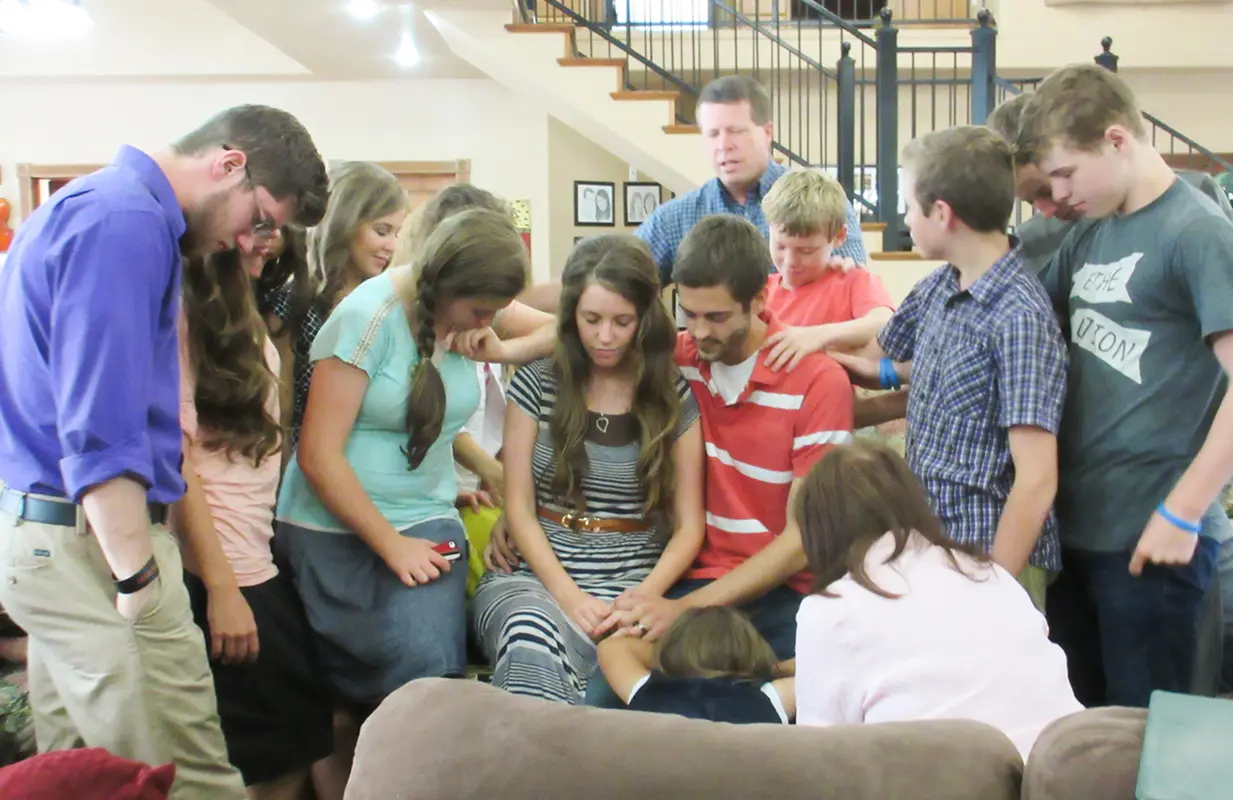The Cult Next Door Is an Ideal Follow-Up to Shiny Happy People
-
 The Duggars are widely considered the "poster children" for the Institute in Basic Life Principles, a Christian fundamentalist organization. (Photo: Everett Collection)
The Duggars are widely considered the "poster children" for the Institute in Basic Life Principles, a Christian fundamentalist organization. (Photo: Everett Collection)Prime Video's new Duggar docuseries, Shiny Happy People: Duggar Family Secrets, is more than just a retelling of the family's rise to fame and their many scandals — it's a damning indictment of the Christian fundamentalist organization that birthed them, the Institute in Basic Life Principles, known as IBLP. For long stretches, the four-part series leaves the Duggars behind as it examines the "cult-like environment," as Jill Duggar describes it, fostered within IBLP and its homeschooling program, the Advanced Training Institute (ATI). Ex-members speak openly about the trauma they endured at ATI facilities, where many were forced into child labor, while others recall being sexually abused by IBLP founder Bill Gothard at the ministry's Chicago headquarters. (Gothard has denied all allegations of sexual abuse and harassment.)
While Shiny Happy People is the most in-depth exposé on the rampant abuse within IBLP, it's not the first project to shed light on Gothard's exploitative, fear-based teachings and his alleged misconduct. In February 2017, filmmaker Jake Youngman released The Cult Next Door, a documentary short that makes for an ideal follow-up to Julia Willoughby Nason and Olivia Crist's new series.
The Cult Next Door — which shares a title with a comprehensive 2016 Chicago Magazine piece about IBLP — covers a lot of ground in just 30 minutes as it charts Gothard's ascent (and his recent fall), elucidates his fundamentalist teachings, and gives survivors space to process their repressive, traumatic upbringings. Youngman's subjects, including Don Veinot, president of Midwest Christian Outreach Inc., and prominent ex-member Micah J. Murray, explain Gothard first launched the program in 1961 (though it had a different name until 1989) as a series of seminars about the importance of upholding traditional values in an era of political, social, and cultural upheaval.
Gothard primarily preached about obeying "authority" — not just God's authority, but that of all fathers, and, ultimately, that of Gothard himself — lessons that appealed to Evangelical Christians. Infographics reveal that estimated attendance at Gothard's workshops increased exponentially, from 2,000 in 1968 to 200,000 in 1973. "He was filling out stadiums at the time when the Beatles were just filling out stadiums," says Veinot. "He was sort of a rockstar in fundamentalist Christianity."
The film is particularly effective at laying out why Gothard's belief system was so appealing to the vulnerable: Murray and other former members recall the "big promises" Gothard made to their parents about the "success" of his program and the "results" they would see in their daily lives. But once they became involved with the organization, people were isolated from the outside world, as IBLP leadership claimed that rejecting non-Christian society and media was the only way to "protect" oneself from sin. A culture of fear and shame, reinforced by everything from ATI's curriculum to IBLP-created board games, trapped members, while Gothard's teases of "more hidden revelations" to come pulled some in even deeper.
Given its limited length and the timing of its release, The Cult Next Door only offers a brief look at the sexual abuse allegations that led to Gothard's resignation in 2014. (Youngman is also relatively unconcerned with the Duggars; he devotes about four minutes to Josh Duggar's 2015 abuse scandal before returning to the stories of these everyday people.) Though none of the film's subjects claim to have been abused by the IBLP president, who was sued by 30 women in 2016 — the suit was dismissed in 2018, one year after the documentary was released — they weren't surprised when reports about Gothard's alleged impropriety emerged.
"I definitely observed Gothard's special attention that he gave to attractive, vulnerable young women when I was working at his center in Indianapolis," says Murray. "We all could see it. And we didn't know the extent of what was going on. But we knew, 'Oh yeah, Gothard has a type.'"
For those who watched Shiny Happy People, none of this is new information — and the way The Cult Next Door integrates interview footage with lo-fi B-roll and grainy archival photographs may even be a bit distracting. But if viewers can get past the amateur feel, they'll find a worthwhile documentary that offers a concise look at IBLP and Gothard's sinister cycle of manipulation, as told by the survivors who are still dealing with the emotional fallout. Plus, in the context of the global plot to spread Christian fundamentalism (as detailed in the final episode of Prime Video's docuseries), Youngman's willingness to go up against such a powerful, well-funded threat with limited resources of his own becomes all the more impressive.
The Cult Next Door is available to stream on YouTube and Vimeo.
Claire Spellberg Lustig is the Senior Editor at Primetimer and a scholar of The View. Follow her on Twitter at @c_spellberg.
TOPICS: Institute in Basic Life Principles, Prime Video, YouTube, The Cult Next Door, Shiny Happy People: Duggar Family Secrets